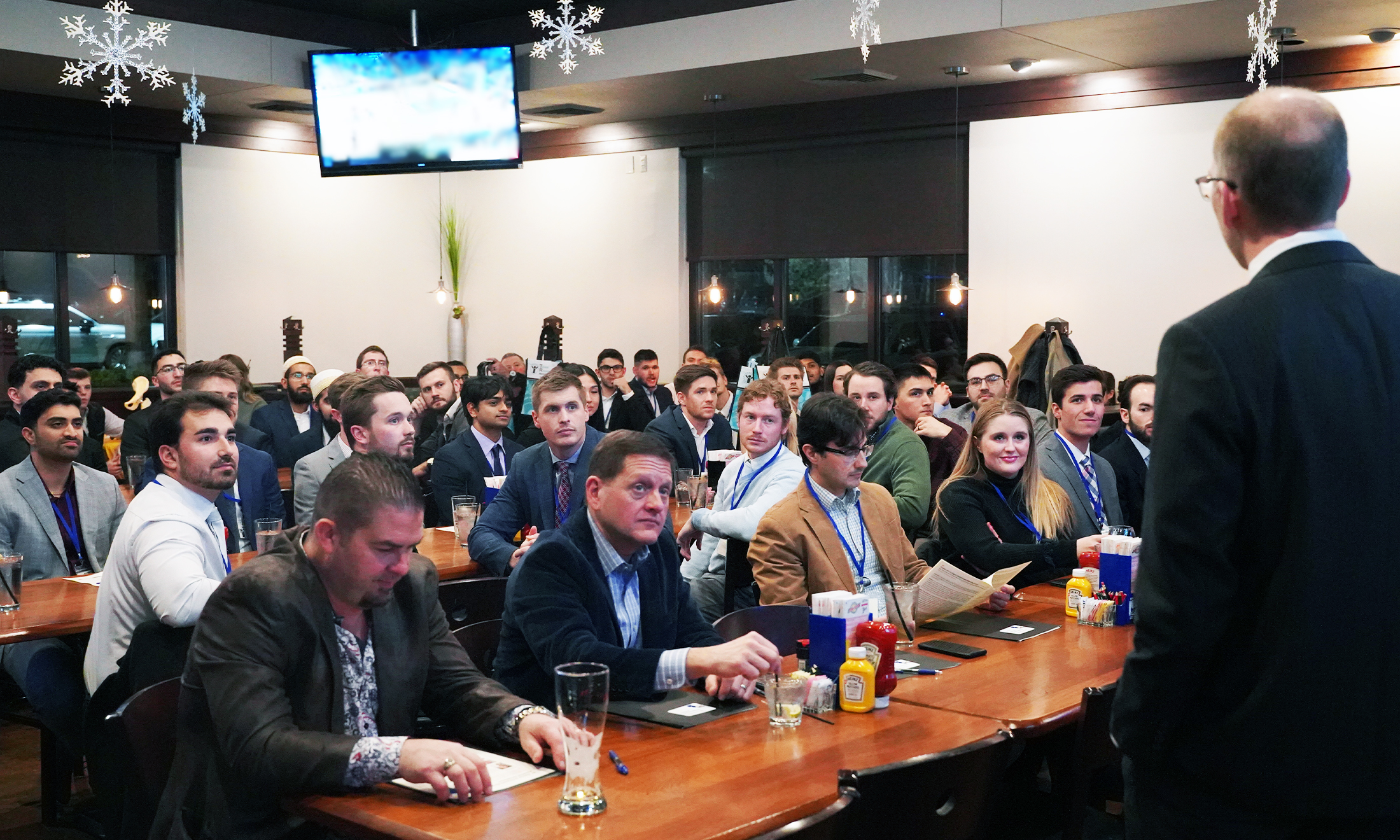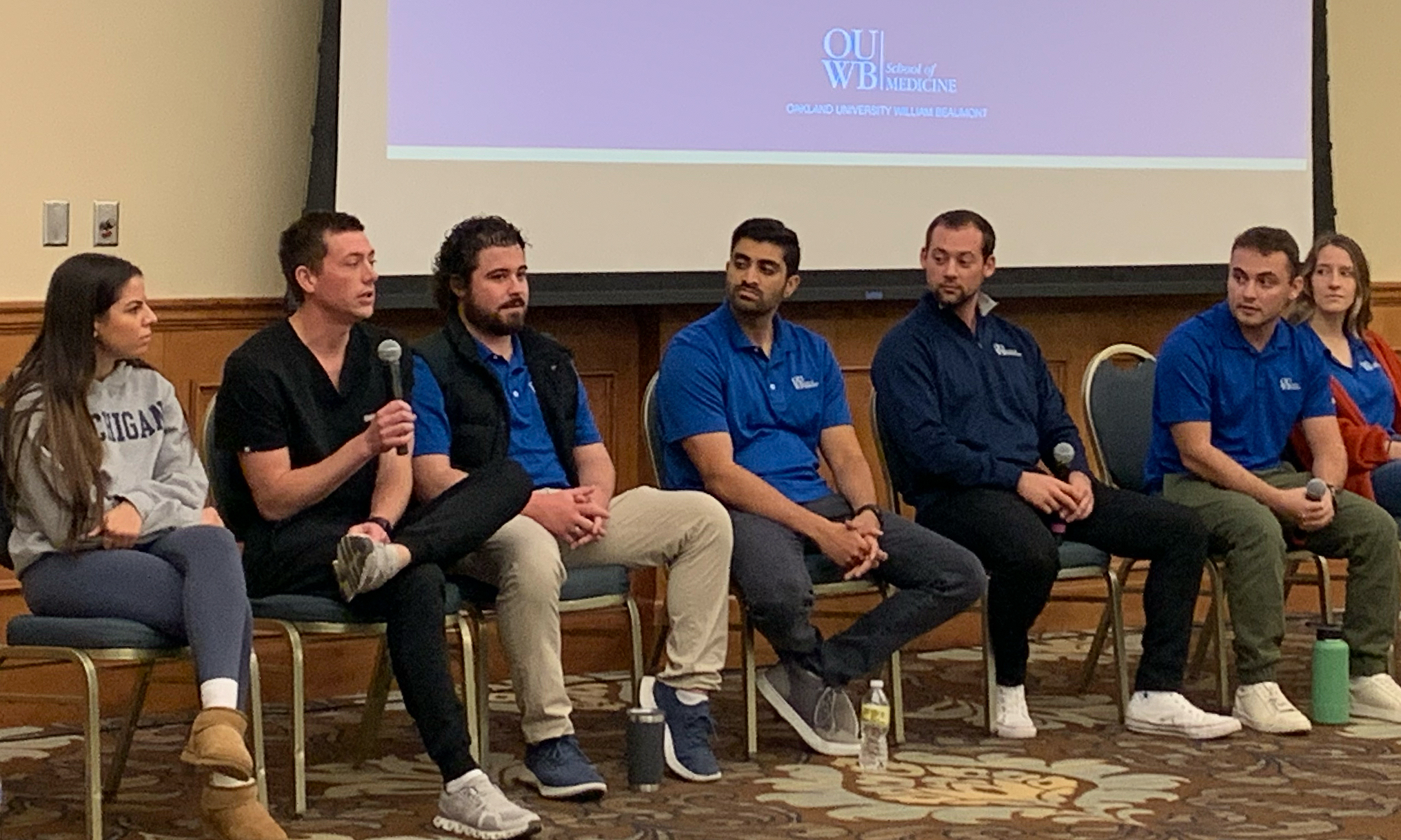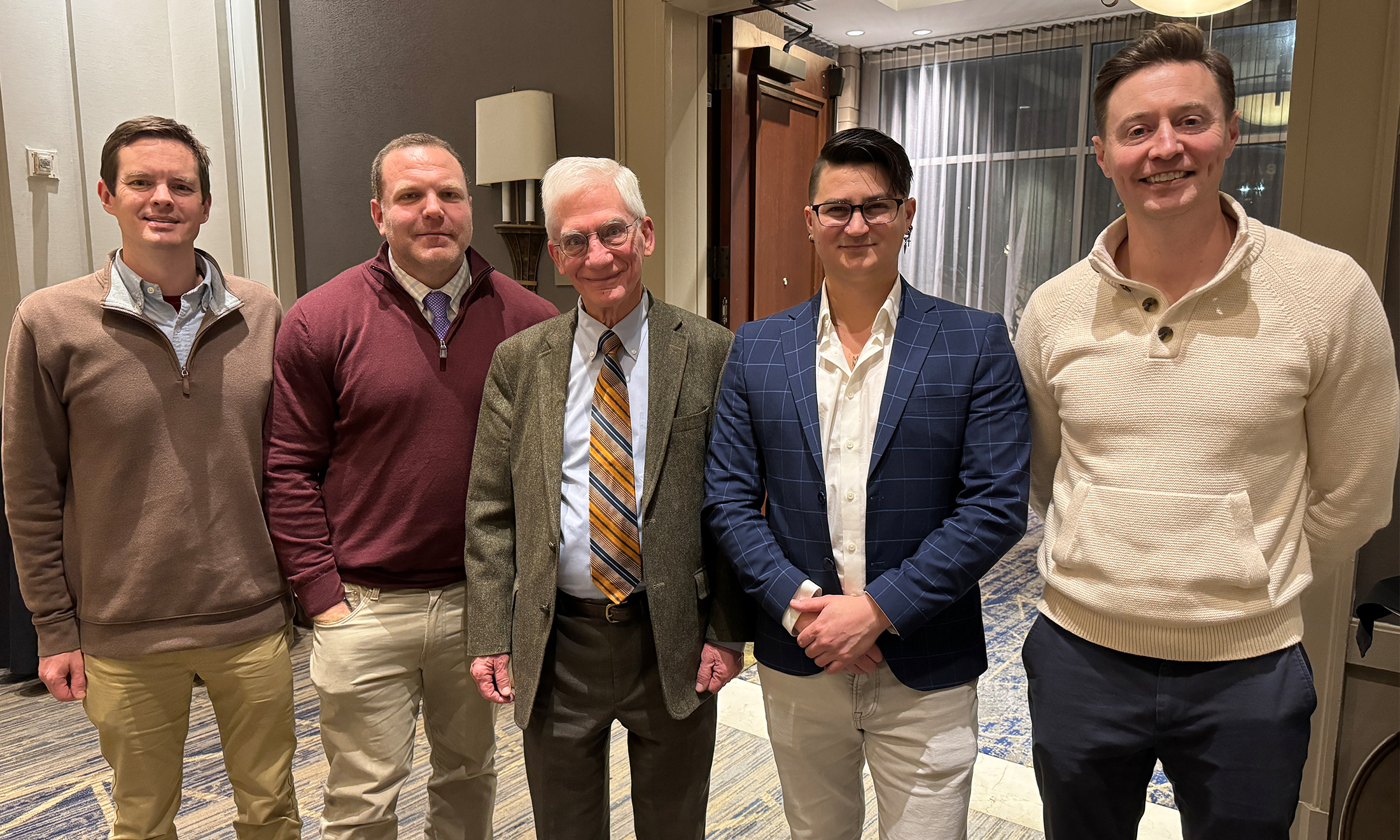‘Honored and proud’
Donors, OUWB students and officials reflect on Study Trip to Auschwitz
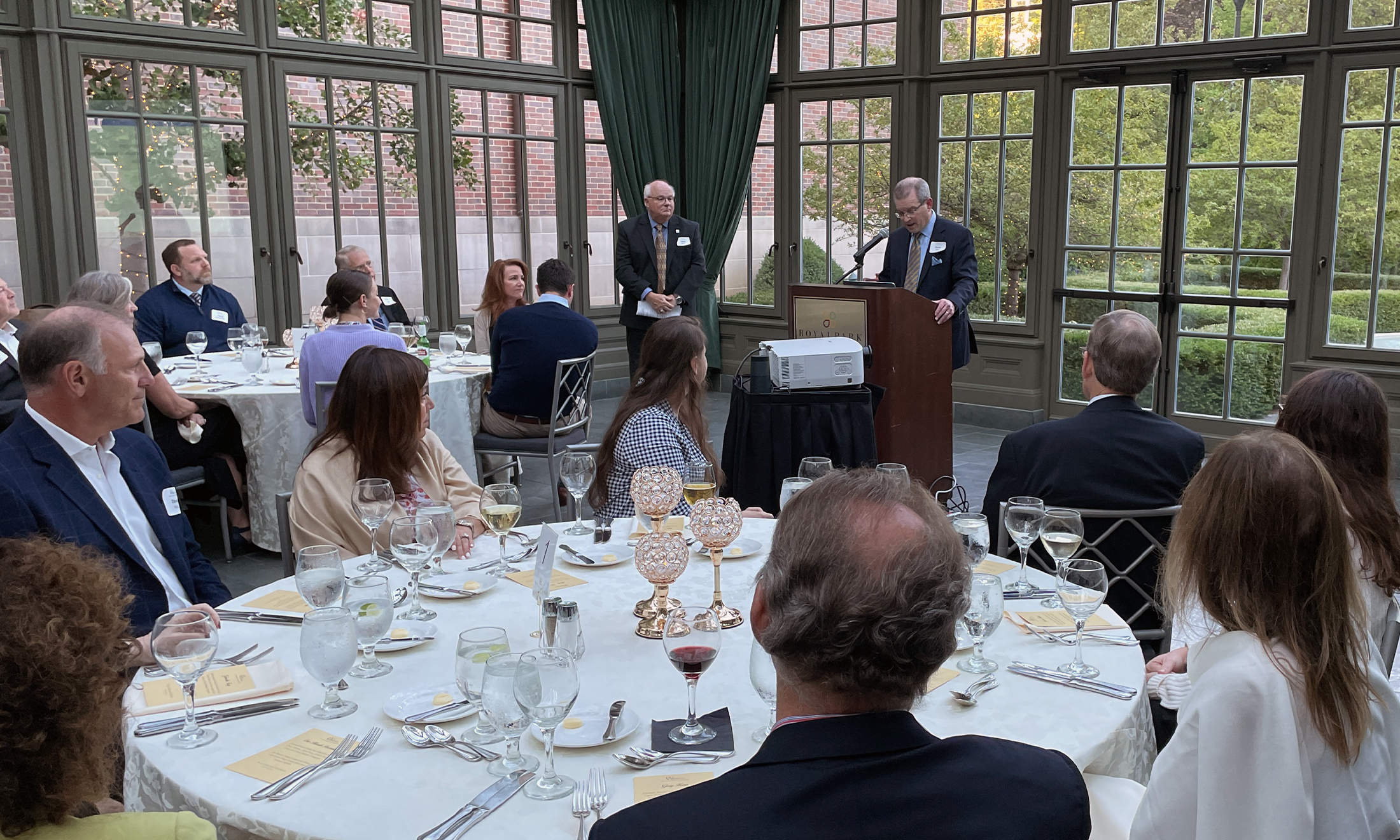
David Grey, M.D., a Beaumont ophthalmologist and assistant professor, Department of Ophthalmology, OUWB, is a donor for the program and participated in the inaugural trip. He called the experience “one of the most meaningful and important experiences in my life.” (Photo by Andrew Dietderich)
Students and officials from OUWB recently gathered with donors to reflect on their June trip to Poland — part of the school’s Holocaust and Medicine program — and looked ahead to what’s next.
The Study Trip to Auschwitz Reflections Dinner was held Sept. 7 at the Royal Park Hotel in Rochester. About 40 people attended, all with connections to the program, including donors, students, faculty, and administrators from Oakland University and OUWB.
| Visit the OUWB webpage dedicated to the OUWB Holocaust and Medicine program by clicking here. |
The evening primarily centered on the June 13-20 Study Trip to Auschwitz, which is part of OUWB’s Holocaust and Medicine program. Nineteen students traveled to Poland to learn about Jewish heritage and history, the implications of the Holocaust for their own personal and professional development within the medical field, how physicians reacted on all sides, and to take part in reflective writing sessions, and more.
Duane Mezwa, M.D., Stephan Sharf Dean, OUWB, went to Poland with the group and talked about his experience during the Sept. 7 dinner.
“Without a doubt, it was an experience that will help shape these future physicians as they become healers,” he said. “It will have an impact on their perspective and value system.”
“I can’t stress how incredibly important it is to reflect on these events and the questions that arise as they relate to bioethics,” added Mezwa. “The future of medicine depends on it.”
During the Study Trip to Auschwitz, the OUWB contingency spent two days in Krakow and the rest of the time in Oswiecim, home to the sites of the former Auschwitz 1 and Auschwitz-Birkenau concentration camps. (Complete details can be found on this webpage specific to the trip.)
A brief overview of the trip was provided by Jason Wasserman, Ph.D., professor, Department of Foundational Medical Studies, and program co-director.
Wasserman created the trip itinerary with co-director Hedy Wald, Ph.D., clinical professor of Family Medicine at the Warren Alpert Medical School of Brown University.
Overall, he said, the intent was to provide insight into the atrocities committed by the Nazis as well as the moral commitment of Jewish physicians and other resistors.
Wasserman said this was accomplished in large part with the help of the tour guides who worked with the group: Aleksandra Kowalczyk in Krakow, and Teresa Wontor-Cichy and Krzysztof Antoczyk, Ph.D., head of Auschwitz’s digital archive, at the concentration camps.
He also noted the big difference between studying the Holocaust from afar and up close and personal. By example, he pointed to Wontor-Cichy taking the OUWB group into Auschwitz 1’s Block 10, where many horrific experiments were performed by Nazi doctors.
“I can’t tell you the power of hearing the history while standing within the walls of the place where it actually happened, and trying to wrestle with that in that space” he said.
The video above features students and OUWB faculty talking about the trip to Poland.
‘Honored and proud’
Two people who went on the trip shared some of their insights at the Sept. 7 dinner.
Kaycee Fillmore, M2, said the trip “was impactful for me for many reasons.”
“I realized that each of us has a choice about which side of the line we stand,” she said. “I also realized that, as medical students progressing into the medical profession, we really do have an important responsibility to advocate for human rights and for compassion.”
Another speaker was David Grey, M.D., a Beaumont ophthalmologist and assistant professor, Department of Ophthalmology, OUWB. (Grey is a donor for the program and participated in the inaugural trip.)
He called the experience “one of the most meaningful and important experiences in my life.”
“I am personally so honored and proud to have traveled with these students,” he said. “I’m so impressed with your thoughts, questions, and am confident in your futures as physicians.”
All speakers expressed a tremendous amount of gratitude for the donors.
| More from OUWB |
‘Life-changing’: OUWB students return from study trip to Auschwitz Med students visit local Holocaust center, continue prep for OUWB Study Trip to Auschwitz |
“This wouldn’t have been possible without all of the people in the room,” said Wasserman. “I want to thank you from the bottom of our hearts.”
He noted the strong support of the program by Ora Hirsch Pescovitz, M.D., president, Oakland University. Pescovitz not only supported the idea, but was the first program donor.
Mezwa also expressed gratitude to all who made the trip possible. When he asked all of the donors in the room to stand, they were greeted with applause.
“Thank you so much,” he said. “Because of you, future generations of students and physicians will make this once-in-a-lifetime trip.”
Fillmore thanked the donors as well.
“You saw the great value (this experience) would provide,” she said. “For my colleagues and myself, I want to send the greatest thank you…we’re very grateful for all of your investment in this initiative.”
The students also were thanked several times.
Wasserman praised them for spending part of what is essentially their last summer vacation on the Study Trip to Auschwitz.
“I think that really speaks very highly to the caliber of students we have at OUWB…they wanted to invest in this experience,” he said. “And it wasn’t an easy experience…this was certainly no vacation.”
Mezwa also gave the students accolades.
“I’m proud and incredibly humbled to see how gracefully our students approached this difficult subject matter,” he said. “It truly speaks to their quality and their character.”
“You can read about history in textbooks and learn about it in a classroom, but nothing really comes close to experiencing it yourself,” he added.
‘A tremendous amount of interest’
Students who went on the Study Trip to Auschwitz currently are in the midst of a seven-week post-trip seminar that began in early August.
They are discussing and reflecting on the trip experience, the relevance of the Holocaust to contemporary medicine, and working on projects to spread the word throughout the community on what they learned.
Wasserman said presentations will be made locally at places like the American Society of Bioethics and Humanities conference being held this fall in Portland, Oregon.
Concurrently, plans are being made for future versions of the OUWB Study Trip to Auschwitz.
Mezwa said during the event that it “will continue not just next year, but into perpetuity.” The biggest challenge going forward, he said, is likely to be deciding which 20 applicants will be selected to travel to Poland.
“Almost every student I run into now is asking me about the program,” he said. “There’s a tremendous amount of interest.”
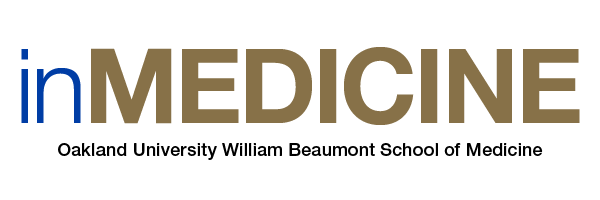
 Oct. 7, 2022
Oct. 7, 2022 By Andrew Dietderich
By Andrew Dietderich